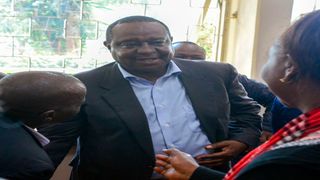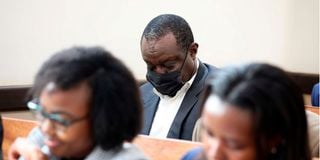
Former Finance Cabinet Secretary Henry Rotich (centre) at a Milimani court in Nairobi on Thursday, December 14.
| Dennis Onsongo | Nation Media GroupNews
Premium
How DPP bungled ex-Finance CS Henry Rotich’s Arror, Kimwarer case
The prosecution literally abandoned the case and the trial magistrate had no kind words for them.
She termed the conduct of the Director of Public Prosecutions office as a dereliction of public duty.
It happened in not one, not two or three State witnesses but 41 of them who had been bonded to testify in the trial of former Finance Cabinet Secretary Henry Rotich and eight others.
Some of the witnesses included former Agriculture CS Peter Munya and the investigating officer who appeared in court, took the oath only for the prosecution to say they have no questions for them.
Ordinarily, a witness takes two or three days depending on the weight of the evidence they are supposed to give. The cross-examination would take more days as defence lawyers seek to disentangle their clients from the evidence.
In the ruling yesterday, the ODPP came under severe criticism in the manner in which it handled the trial as the magistrate said it was choreographed to lead into the acquittal of the accused persons.
Acquitting the nine, the anti-corruption court chief magistrate Eunice Nyutu said: “There is no evidence presented to me to warrant the accused persons to be put on their defence. I acquit them all under Section 210 of the Criminal Procedure Code (CPC).”
The magistrate directed her judgment be placed before the relevant agencies of the justice system to discuss the conduct of the prosecution, terming their conduct as wanting and acting contrary to the powers donated to them under the Constitution.
The magistrate noted that despite bringing the case with a lot of gusto, the prosecution abandoned after the eighth witness testified.
And immediately after the judgment Mr Rotich said: “No amount of lies or falsehoods levelled against me survived. The devil has been ashamed and remains permanently ashamed, for those who schemed this evil against me.”
The magistrate stated: “The prosecutors failed to lead evidence from 41 witnesses by telling this court ‘we have no questions for these witnesses’.”
The former CS was charged with a total of 19 counts including unlawfully executing loan agreements for a combined £578,309,578 to finance the construction of Arror and Kimwarer multi-purpose dams.
One of the charges stated that Mr Rotich used his office to improperly confer the benefit of contractual rights to the joint venture formed outside Kenya by two Italian suppliers — Cooperativa Muratori & Cementisti (CMC di Ravenna) and Itinera S.P.A.
The Italian firms won the international tender launched by KVDA to construct the dams in Elgeyo-Marakwet County.
Also Read: Henry Rotich dams case - Puzzle of 29 witnesses prosecution, defence chose not to question
The prosecution had claimed that Mr Rotich created an obligation against the government of Kenya by unlawfully executing the facilities agreement.
But Mr Rotich, through his lawyer SC Kioko Kilukumi, said the prosecution was ill-advised from the beginning and was ‘carried on the wings of extraneous political considerations’.
“It was not mounted on the cogency of evidence of criminal culpability. It was bound to fail. It is a matter of judicial notice that during the campaigns for the 2022 General Election, rival political coalitions made political capital out of Arror and Kimwarer dam projects, giving a very clear indicium that the prosecution was instituted for the wrong motives,” he said.
The lawyer maintained that the narrative that money was lost or stolen was just fiction.
“If indeed money was lost as the public was led to believe, how come the Asset Recovery Agency (ARA) has not been able to trace any stolen loot and freeze it?” Mr Kilukumi posed.

Former Treasury Cabinet Secretary Henry Rotich in court on September 20, 2022 during the hearing of the Kimwarer, Arror dams case.
He said it was not surprising that the two governments (Italy and Kenya) had reached an understanding to restart the projects that were stalled by bad politics and malicious prosecution.
Mr Rotich defended himself saying he did not execute the two construction contract agreements both dated April 5, 2017 and could not, therefore, properly or improperly confer contractual benefits to the joint venture companies.
He said as the Treasury CS, he was under a statutory duty to execute the facilities agreements as section 52 (1) of Public Finance Management Act (PFMA) provides that the CS, or any person designated by the CS in writing, is authorised to execute loan documents for borrowing by the national government.
He further added that before execution, the advice of the then Attorney-General Githu Muigai was sought, confirming the legality of the process.
“It was a contractual obligation under the Facilities Agreements to pay SACE S.P.A, being the insurer of the financiers. The first accused (Mr Rotich) acted in accordance with the PFMA in paying for the insurance as pre-negotiated expenses associated solely and exhaustively with the borrowing,” he said.
“Your honour, we submit that from the facts set out in the case and the evidence so far on record, the prosecution did not establish whether any meetings took place or whether the second and third accused persons attended any such meetings if at all with any of the other co-accused with the sole intention of defrauding the Government of Kenya $501,829,769.43,” lawyer Philip Nyachoti who represented Mr Nyakundi and Mr Kinyanjui said.
The magistrate said Mr Rotich played no role in the procurement of the projects which he said was the sole duty of Kerio Valley Development Authority (KVDA).
Ms Nyutu noted KVDA gave the licence for the initiation of the projects.
She, however, added the project did not take off since it had been opposed by the Kenya Forest Services (KFS) which said the dams’ construction would affect 400 hectares of land.
The court noted KFS was concerned that the government had not gotten alternative land to resettle the people who would be moved out of their homes to pave the way for the dam.
She said even before the project had started money was being sought for payment from the public coffers.
The court observed that questions had been raised about the companies awarded the project with one being singled out “having won the contract long before its registration”.
Ms Nyutu said the prosecution locked out crucial which would have shed light into this multibillion project scam.
After acquitting them, Ms Nyutu ordered cash bails and bonds deposited in court be returned to the depositors






